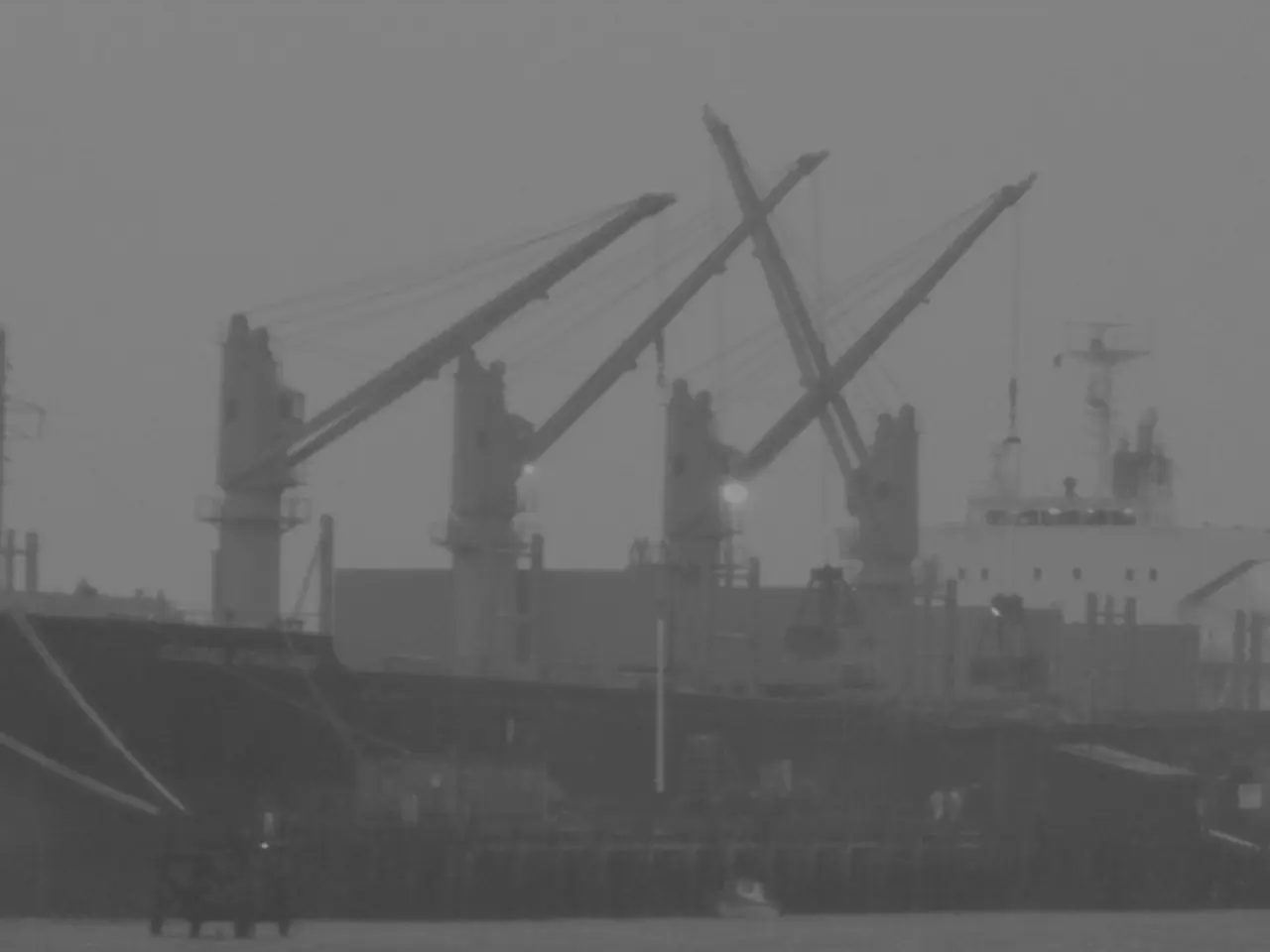Enhanced oceanic safeguards provoke varied responses among its constituents - Enhanced Marine Preservation Triggers Split Opinions
In a significant move towards environmental protection, the OSPAR Commission, an international body responsible for the protection of the North Atlantic marine environment, has announced a ban on the discharge of wastewater from ship exhaust gas cleaning systems (scrubbers) into the sea near the coast after July 2027 [1][3]. This decision, which was formally adopted on June 26, 2023, in Vigo, Spain, marks a landmark step in the region's efforts to reduce hazardous discharges from exhaust gas cleaning systems (EGCS) in coastal and internal waters [1][3].
The ban, set to come into effect by mid-2027, is part of a phased approach agreed by 15 countries and the European Union. The ban includes the prohibition of open-loop and hybrid scrubber discharge in ports and inland waters by July 2027, and the ban on closed-loop scrubber discharge by January 2029 [1][3]. This expansion of protection in the region is aimed at minimising environmental risks associated with scrubber wastewater.
However, the decision has not been without controversy. The German Shipowners' Association (CSA) has urged OSPAR to base these restrictions on a more thorough scientific understanding before implementation [2]. They argue that the precautionary principle should be invoked only when supported by credible scientific evidence and point out the existence of many credible scientific studies showing little or no environmental risk from EGCS discharges [2]. The CSA also criticises the decision as a "regional solo effort" [2].
The International Maritime Organization (IMO), the global standard-setting authority for the safety, security and environmental performance of international shipping, has recommended that member states conduct environmental risk assessments before imposing restrictions [2]. However, the CSA states that these recommendations have not been adequately followed by OSPAR members [2].
Despite these concerns, the ban is expected to force shipowners operating in the North-East Atlantic to either convert or replace their open-loop scrubbers, switch to hybrid systems, or move away from high-sulfur fuel oil (HSFO) to more expensive very low sulfur fuel oil (VLSFO) [1]. This could lead to increased compliance costs for shipowners and potential operational changes due to the need to avoid scrubber discharge in the banned areas.
The debate around the ban and calls for further scientific data highlight ongoing tensions between environmental precaution and economic/technical feasibility in shipping regulation [2]. Environmental group Nabu supports the stricter marine protection guidelines agreed upon by coastal countries, including Germany [2].
The ban is a part of a growing trend in regional marine environmental regulation that could lead to more extensive restrictions in other seas and ports globally. As we approach 2027, the focus will shift towards the potential extension of these regulations to other marine zones.
It is important to note that scrubbers are a proven solution for filtering sulfur and other pollutants from ship exhaust gases [2]. Studies confirmed by the maritime federal authority BSH indicate the questionable nature of scrubber wastewater, but overall, they show that the wastewater from scrubbers is not harmful [2].
The European Union (EU) is also a part of the countries that have agreed upon the stricter marine protection guidelines. The executive director of the Ospar Commission, Dominic Pattinson, has emphasised the importance of protecting the North Atlantic marine environment for future generations [1]. Nabu, along with other European environmental protection organisations, had previously advocated for stricter rules [2].
In Hamburg, Germany, the resolution was announced, signalling a significant step towards a cleaner North-East Atlantic. The IMO is currently working on a scientifically based assessment, according to the German Shipowners' Association's knowledge [2]. The resolution to ban the discharge of waste from ship exhaust gas cleaning systems (scrubbers) into the sea near the coast after July 2027 has been approved by all 16 contracting parties of the Ospar Commission [1].
References: [1] German Press Agency, 2023. OSPAR Commission bans scrubber discharge in North-East Atlantic. [Online]. Available at: https://www.dpa.de/de/presse-mitteilungen/ospar-kommission-verbietet-schwimmwasserentlaufer-im-nordostatlantik-1483682
[2] German Shipowners' Association, 2023. Statement on the OSPAR Commission's decision to ban scrubber discharge in the North-East Atlantic. [Online]. Available at: https://www.csa-ev.de/en/media/press-releases/statement-on-the-ospar-commissions-decision-to-ban-scrubber-discharge-in-the-north-east-atlantic
[3] OSPAR Commission, 2023. Decision on the ban of scrubber discharge in the North-East Atlantic. [Online]. Available at: https://www.ospar.org/documents/2023/06/decision-on-the-ban-of-scrubber-discharge-in-the-north-east-atlantic-2023-06-26-en.pdf
- The ban on the discharge of wastewater from ship exhaust gas cleaning systems (scrubbers) in EC countries' coastal and internal waters, set to take effect in mid-2027, is part of a broader trend in environmental science, focusing on mitigating the risks associated with climate-change and protecting the marine environment.
- The German Shipowners' Association (CSA) has called for a more thorough scientific understanding before implementing the ban, citing many credible environmental-science studies showing little or no environmental risk from exhaust gas cleaning system (EGCS) discharges.
- As the ban on scrubber discharge in the North-East Atlantic comes into force, the focus shifts towards the potential extension of these regulations to other marine zones, reflecting the increasing importance of financial resource allocation for environmental protection and the role of industry in transportation's transition towards sustainability.




